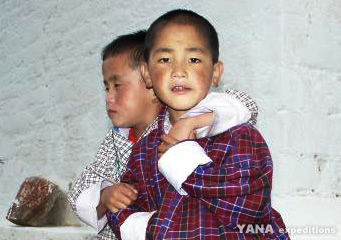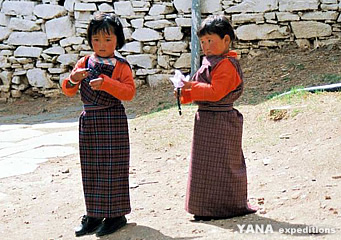| Sie sind hier: | Home > Bhutan > Development > Topics > Projects > WFP in Bhutan > Alternative assistance | Search |
 |
| Bhutan - Development |
|
 |
| World Food Programme in Bhutan |
| Not quite 'abandon ship!' |
|
|
| WFP will phase out only after making sure of alternative assistance from government |
 |
|
WFP is scheduled to conduct a mid-term review sometime in September this year, which Dungkar Drukpa said, would determine whether the assistance would be discontinued or not, in accordance with their agreement. Indicators like high per capita income and net primary enrolment rate, he said, showed Bhutan as being more stable than many other vulnerable countries around the world.
"WFP assists countries until they are able to stand on their own feet and develop economically," he said. "Bhutan today is on the right track, so WFP decided to phase out its assistance, so they could divert their aid to more needy countries."
Dungkar Drukpa clarified that WFP stopped the feeding programs for classes X and XII in 2008, and for classes IX and X in 2009, but continued to feed 10 middle secondary schools until 2010.
"The government recompenses through provision of Nu 700 stipend to all the boarding students between classes IX and XII," he said.
WFP provides about USD 200K, with some USD 500K for non-food items annually, besides USD 35K and USD 40K annually for school agricultural program (SAP) initiated in many schools.
At present, WFP provides breakfast and lunch to some 221 primary and community boarding and day scholars, including substantial amount for hostels, kitchens with store facilities, matron's quarters, girl's shower blocks, fuel efficient and electric cookers. The assistance is mostly provided to remote and off-road schools.
"Government provides stipend of Nu 240 to provide the third meal to boarding schools and not Nu 125 as stated by education officials," Dungkar Drukpa said.
WFP officials said that, in case if they phase down, they will make sure that there is always an alternative assistance from the government. "Government has successfully taken over the assistance for boarders, but we're still trying to get government to agree on supporting day scholars, once assistance to them is phased out," he said.
Dungkar Drukpa said to ensure that with WFP phasing out its assistance doesn't leave anyone in the country dejected, they would have discussions with the government to continue its support.
| contributed by Yangchen C Rinzin , Kuensel, Bhutan's National Newspaper, May 2010 |
| Alternative assistance from Thai princess's NGO |
 |
|
With the organisation further planning to scale down the school feeding program by the end of the current plan, it's only feeding the education ministry's growing apprehension.
Head of policy and planning division, Jambay Wangchuk, said it meant that the assistance would be phased out in secondary, primary and community schools in the remote parts of the country.
Education officials said that, although WFP wanted to scale down its assistance since the eighth plan, but following research by the education ministry revealing a dire need, the program continued.
"WFP phased out their assistance from higher and middle schools in 2008 and early 2009 respectively," education officials said. "But they'll continue to provide meals for primary and secondary schools until 2013."
Until recently, higher and middle secondary schools were provided two meals a day under WFP, with an additional stipend of Nu 125 from the government.
But, ever since the program was phased out, the government had to provide a stipend of Nu 700 per student in some 22 higher and 13 middle secondary boarding school across the country to provide for their daily three meals.
Education officials said that, in 2012, WFP would review primary, secondary and community schools and their real need of further assistance, before deciding on trimming it down.
"WFP provides two meals a head a day, with the government providing an additional Nu 240 stipend to these schools," chief program officer Chencho said.
Jambay Wangchuk, explained that WFP was yet to confirm on their decision, which is expected to be done after their review in 2012. "The decision comes from constricted resources and their shift of priority to more needy countries in Africa," he said.
Currently WFP provides meal for 36,317 school students in more than 214 schools, of which 70 percent are primary and 30 percent secondary schools. "Every year, WFP provides between USD 3 5,000 and USD 40,000," Chencho said.
Education ministry officials, however, see a glimmer of hope as they anticipate that the falling food assistance would be supported by a non-governmental organisation in Thailand, founded by Thai princess Maha Chakri Sirindhorn.
Ambassador and delegates from the foundation visited various schools in the country a few weeks ago. "They'll inspect and study the conditions of boarding schools in Bhutan and submit a report to the princess," Jambay Wangchuk said.
The foundation, he said, was well-known for its continued support in school feeding programs in Thailand, as well for its assistance to a few neighbouring countries.
Besides the feeding program, Jambay Wangchuk also said, if their request for assistance from the Thai princess came through, students could also learn to maintain agricultural programs of growing vegetables, rearing livestock, fishery, poultry and piggery farms under expert trainers from Thailand.
"We expect the aid in terms of sustainable developments rather than monetary."
| Contributed by Yangchen C Rinzin , Kuensel, Bhutan's National Newspaper, May 2010 |
|
|
| Links |
| Externe Links |
| United Nations World Food Programme |
 |
|
|
|